How to implement polygons in css
How to implement polygons in css: first create an HTML sample file; then implement the parallelogram through the skew attribute of transform; then use the before pseudo-element to implement the triangle; and finally combine the parallelogram rows and triangles to implement the polygon.
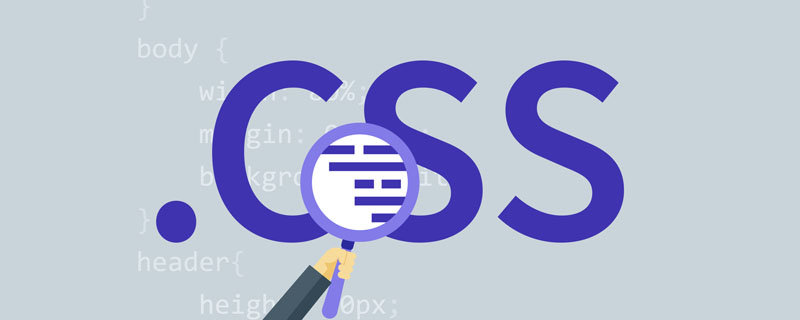
The operating environment of this article: windows7 system, HTML5&&CSS3 version, DELL G3 computer
How to implement polygons in css?
CSS | Implementing interesting polygons
The road to front-end development is long. On the way to the web world, we must have encountered polygonal designs. The simplest way is to just upload the picture and start. As a front-end with "pursuit", of course you have to "self-abuse"... Today we will talk about how to implement polygons in front-end programming. First, upload a picture, and then we can Think about how to implement it first.
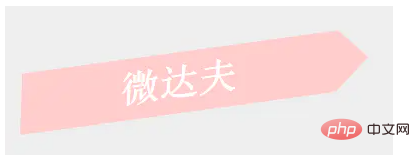

Rendering
"How to implement it", "Is there any text in italics upwards", "Word Tian , you’d better give me the img directly, it feels so troublesome.” Relax, take a deep breath, and follow me to see how to polish CSS.
This label-like polygon can be seen as a combination of parallelograms and vertical triangles. First, add a rectangle:
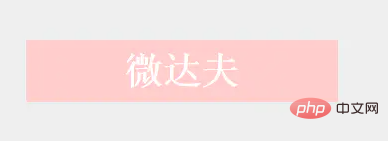
Simple width, height
How do you turn a rectangle into a parallelogram? Take a rectangle made of wire as an example. How do you turn it into a parallelogram? Someone answered: It's very simple, just twist it a little bit. By the way, it's distortion, the skew attribute of transform.
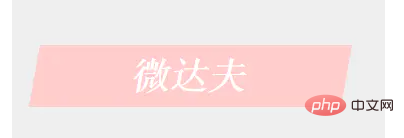
transform: skew(-10deg);
Hey, someone asked at this time, is it not slanting upward? How to break it, don’t worry, look:
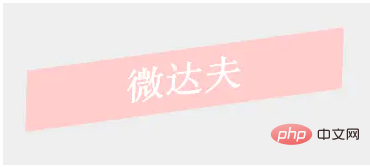
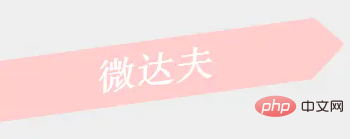 ##Use width: 0;height: 0
##Use width: 0;height: 0
The code is as follows:
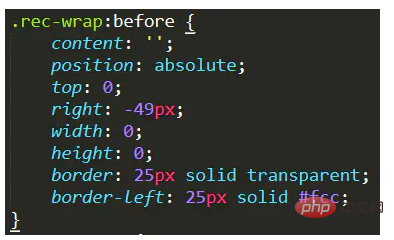 Triangle code
Triangle code
Why use before pseudo-element? You know, to facilitate layout, the width and height are both 0 very cleverly, and the color and position of the border are used to set it, including most polygons you usually see, which is almost the same principle. The final code is as follows:
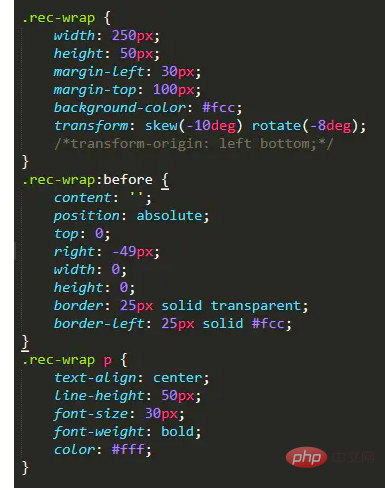 As a css explorer, try setting different borders, combined with transform, to see what clever effects there are, pentagrams, octagons... With everything at your fingertips, attack the polygonal world.
As a css explorer, try setting different borders, combined with transform, to see what clever effects there are, pentagrams, octagons... With everything at your fingertips, attack the polygonal world.
Recommended learning: "
css video tutorialThe above is the detailed content of How to implement polygons in css. For more information, please follow other related articles on the PHP Chinese website!

Hot AI Tools

Undresser.AI Undress
AI-powered app for creating realistic nude photos

AI Clothes Remover
Online AI tool for removing clothes from photos.

Undress AI Tool
Undress images for free

Clothoff.io
AI clothes remover

Video Face Swap
Swap faces in any video effortlessly with our completely free AI face swap tool!

Hot Article

Hot Tools

Notepad++7.3.1
Easy-to-use and free code editor

SublimeText3 Chinese version
Chinese version, very easy to use

Zend Studio 13.0.1
Powerful PHP integrated development environment

Dreamweaver CS6
Visual web development tools

SublimeText3 Mac version
God-level code editing software (SublimeText3)

Hot Topics
 How to use bootstrap in vue
Apr 07, 2025 pm 11:33 PM
How to use bootstrap in vue
Apr 07, 2025 pm 11:33 PM
Using Bootstrap in Vue.js is divided into five steps: Install Bootstrap. Import Bootstrap in main.js. Use the Bootstrap component directly in the template. Optional: Custom style. Optional: Use plug-ins.
 The Roles of HTML, CSS, and JavaScript: Core Responsibilities
Apr 08, 2025 pm 07:05 PM
The Roles of HTML, CSS, and JavaScript: Core Responsibilities
Apr 08, 2025 pm 07:05 PM
HTML defines the web structure, CSS is responsible for style and layout, and JavaScript gives dynamic interaction. The three perform their duties in web development and jointly build a colorful website.
 How to write split lines on bootstrap
Apr 07, 2025 pm 03:12 PM
How to write split lines on bootstrap
Apr 07, 2025 pm 03:12 PM
There are two ways to create a Bootstrap split line: using the tag, which creates a horizontal split line. Use the CSS border property to create custom style split lines.
 Understanding HTML, CSS, and JavaScript: A Beginner's Guide
Apr 12, 2025 am 12:02 AM
Understanding HTML, CSS, and JavaScript: A Beginner's Guide
Apr 12, 2025 am 12:02 AM
WebdevelopmentreliesonHTML,CSS,andJavaScript:1)HTMLstructurescontent,2)CSSstylesit,and3)JavaScriptaddsinteractivity,formingthebasisofmodernwebexperiences.
 How to set up the framework for bootstrap
Apr 07, 2025 pm 03:27 PM
How to set up the framework for bootstrap
Apr 07, 2025 pm 03:27 PM
To set up the Bootstrap framework, you need to follow these steps: 1. Reference the Bootstrap file via CDN; 2. Download and host the file on your own server; 3. Include the Bootstrap file in HTML; 4. Compile Sass/Less as needed; 5. Import a custom file (optional). Once setup is complete, you can use Bootstrap's grid systems, components, and styles to create responsive websites and applications.
 How to insert pictures on bootstrap
Apr 07, 2025 pm 03:30 PM
How to insert pictures on bootstrap
Apr 07, 2025 pm 03:30 PM
There are several ways to insert images in Bootstrap: insert images directly, using the HTML img tag. With the Bootstrap image component, you can provide responsive images and more styles. Set the image size, use the img-fluid class to make the image adaptable. Set the border, using the img-bordered class. Set the rounded corners and use the img-rounded class. Set the shadow, use the shadow class. Resize and position the image, using CSS style. Using the background image, use the background-image CSS property.
 How to use bootstrap button
Apr 07, 2025 pm 03:09 PM
How to use bootstrap button
Apr 07, 2025 pm 03:09 PM
How to use the Bootstrap button? Introduce Bootstrap CSS to create button elements and add Bootstrap button class to add button text
 How to resize bootstrap
Apr 07, 2025 pm 03:18 PM
How to resize bootstrap
Apr 07, 2025 pm 03:18 PM
To adjust the size of elements in Bootstrap, you can use the dimension class, which includes: adjusting width: .col-, .w-, .mw-adjust height: .h-, .min-h-, .max-h-






